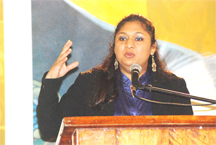Human Services and Social Security Minister Priya Manickchand has expressed hope that South American states will to continue to generate new ideas and commitments in advancing social development within the bloc.
Manickchand, addressing delegates at the formal opening of the Union of South American Nations (UNASUR) ministerial meeting on social development here, said the meeting affords member states an opportunity to review the accomplishments of the past year and plan the way forward.

She said the meeting also provides an opportunity for delegates to advance the work of the council in some specific areas, among them the harmonization of social policies which she noted is “critical to the integration of the union”.
She said the process should be undertaken in a systematic manner, in collaboration with the other councils to avoid duplication of effort. Manickchand said the council should also identify priority areas of action in order to have a maximization of limited resources.
Where regional integration is concerned, she said that the council should ensure that emphasis is placed on outcomes at the regional level being balanced, a move she downturn, there has been renewed growth and economic optimism among nations within the region. “This difference in levels of growth must not affect the internal cohesion of the group and therefore one of our priorities should be on the reduction of asymmetries,” she added.
Within its action plan, Manickchand said, the council should address the identification of programmes to support the goals of UNASUR in order to address the common challenges facing the people of the region in the area of social inclusion and economic development by targeting at-risk groups in workforce development activities.
“Lifting the poor and disadvantaged out of poverty and into the world of opportunity is a priority of each of the governments of the member states of UNASUR,” she said, adding that the council has a critical role to play in terms of social development.
Manickchand said that as South American nations move further towards full integration, coordination of policies in relation to universal access to basic social services will be of greater importance. Therefore, she said that it may be necessary for the council to begin to focus on the conclusion of an agreement to be adopted by member states of UNASUR relating to basic social security services.
The Human Services Minister stated earlier that the centrality of people’s issues to development agendas is widely recognized and has been receiving increasing attention in the last decades.
She noted that the Copenhagen Summit in 1995 and the Millennium Development Goals (MDG) initiative have brought additional world attention to the poor and disadvantaged and have influenced the implementation of social policies the world over. She said nations within South America have proposed initiatives aimed at promoting a more people centred development, among these are, the New Global Human Order advanced by the late President Cheddi Jagan, the Global Hunger Initiative by former Brazilian president Ignacio Lula da Silva, and the Charter of Social Rights for the Americas as proposed by Venezuela President Hugo Chavez.
“This expressed political will on the part of our leaders in South America to improve the well-being of our peoples is further enshrined in the UNASUR Constitutive Treaty and reinforced by the decision in August 2009 to create the Council on Social Development,” she said.
However, notwithstanding such areas of developments, many people continue to live in poor social circumstances today and this will continue to be a challenge for us, she noted.
Manickchand explained that the new wave of globalization led by the information revolution has had its effects on societies and respective national development agendas within member states.
In response to this situation, Manickchand said, Guyana, in partnership with the international community, has instituted social policies and several programmes aimed at improving the well-being of the main target groups among them children and youth, women, the elderly, the family, persons living with HIV/AIDS, persons with disabilities, the unemployed, indigenous populations and the income poor.
She said that it is important that council members share their experiences, noting that individual social programmes can be beneficial through the sharing of information and expertise.




